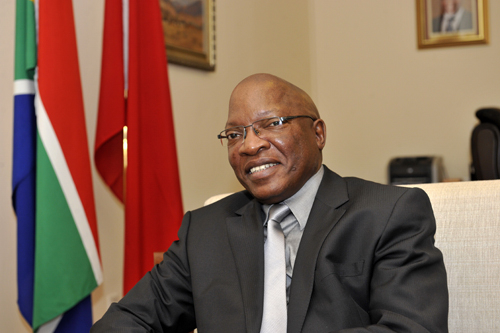|
 |
|
Bheki Langa, South African Ambassador to China (SHI GANG) |
2013 is an important year for South Africa. The country will host the Fifth BRICS Summit in March and it also celebrates the 15th anniversary of the establishment of the diplomatic relations with China. On January 31, Bheki Langa, South African Ambassador to China, sat down with ChinAfrica Assistant Executive Editor Tang Qinghua and shared his thoughts on the upcoming BRICS Summit and relations between China and South Africa.
ChinAfrica: What are your expectations of the Fifth BRICS Summit?
Bheki Langa: "BRICS and Africa - Partnership for Development, Integration and Industrialization" will be the theme of the Fifth BRICS Summit to be taking place in Durban in March. South Africa was admitted to the grouping of powerful emerging economies, which includes Brazil, Russia, India and China, at the third annual summit of the bloc's leaders in China in 2011. The fifth summit - taking place at Durban's International Convention Center from March 25 to 27 - would have four key focus areas: The promotion of African infrastructure development, the establishment of a BRICS-led Development Bank, a BRICS Think-Tank and a BRICS Business Council.
-- Unlocking Africa's potential
South Africa's accession to the BRICS grouping was in large part premised on the country's role as a financial and logistical gateway to Sub-Saharan Africa, and on the continent's huge economic potential. Africa is the fastest growing power after Asia and offers the highest returns on investments of any region. The African continent constitutes 60 percent of the world's unused arable agricultural land. In 2010, six of the world's fastest growing economies emanated from Africa, and Africa's output is expected to expand by 50 percent over the next four years. Economic growth is expected to expand by an average of 5.5 percent annually in the next five years.
-- Toward a more equitable global order
It was this potential, combined with the economic power of Brazil, Russia, India and China, that would enable the BRICS grouping to pave the way for "a new global pattern focusing on South-South relations ... overriding previous East-West and North-South constructs and divisions."
This was in line with the underlying principle for South Africa's partnership with BRICS, that of advancing the role of emerging economies in international relations, ultimately to help fashion a more equitable global political and financial architecture. With South Africa's unique history and independent foreign policy, we bring our own experience and perspective to the BRICS collaboration.
BRICS members suggested to form a BRICS development bank at their last summit, which is said to be a theme of this coming summit. What do you think of this suggestion and what role can this new bank play after it is established?
To build a BRICS Development Bank is not a new idea as it was talked about at the G20 Summit in Seoul in 2010. With a total population accounting for about 40 percent of the world's total, its total gross domestic product accounts for nearly 20 percent of the world's GDP and contributes half of the growth in global economy. There is a huge amount of savings in the BRICS countries, which is not fully used. So the idea started there, it's about how to use the huge amount of savings which are unused."
By such a Development Bank, the BRICS countries can work together to shape a new international monetary system.
As export-led economies, the BRICS countries feel the impact sharply each time global financial crises hit. Drawing on the successful experience of reform, it's necessary for us to set up such a bank for our common development according to our own conditions.
|